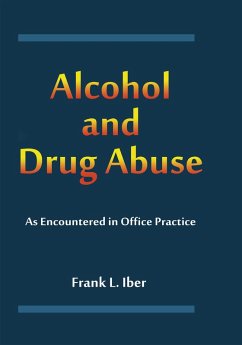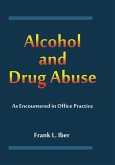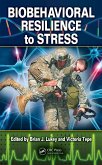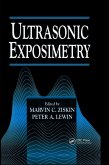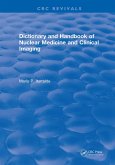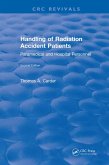Frank L. Iber
Alcohol and Drug Abuse as Encountered in Office Practice (eBook, PDF)
261,95 €
261,95 €
inkl. MwSt.
Sofort per Download lieferbar

131 °P sammeln
261,95 €
Als Download kaufen

261,95 €
inkl. MwSt.
Sofort per Download lieferbar

131 °P sammeln
Jetzt verschenken
Alle Infos zum eBook verschenken
261,95 €
inkl. MwSt.
Sofort per Download lieferbar
Alle Infos zum eBook verschenken

131 °P sammeln
Frank L. Iber
Alcohol and Drug Abuse as Encountered in Office Practice (eBook, PDF)
- Format: PDF
- Merkliste
- Auf die Merkliste
- Bewerten Bewerten
- Teilen
- Produkt teilen
- Produkterinnerung
- Produkterinnerung

Bitte loggen Sie sich zunächst in Ihr Kundenkonto ein oder registrieren Sie sich bei
bücher.de, um das eBook-Abo tolino select nutzen zu können.
Hier können Sie sich einloggen
Hier können Sie sich einloggen
Sie sind bereits eingeloggt. Klicken Sie auf 2. tolino select Abo, um fortzufahren.

Bitte loggen Sie sich zunächst in Ihr Kundenkonto ein oder registrieren Sie sich bei bücher.de, um das eBook-Abo tolino select nutzen zu können.
This book has been written to serve as a manual for physicians practicing in a private office setting to recognize and recommend appropriate treatment for patients believed to be substance abusers. While it is not written for drug abuse specialists, it provides information regarding the diagnosis and treatments a competent, concerned physician can
- Geräte: PC
- ohne Kopierschutz
- eBook Hilfe
- Größe: 45.32MB
Andere Kunden interessierten sich auch für
![Alcohol and Drug Abuse as Encountered in Office Practice (eBook, ePUB) Alcohol and Drug Abuse as Encountered in Office Practice (eBook, ePUB)]() Frank L. IberAlcohol and Drug Abuse as Encountered in Office Practice (eBook, ePUB)261,95 €
Frank L. IberAlcohol and Drug Abuse as Encountered in Office Practice (eBook, ePUB)261,95 €![Stalking Crimes and Victim Protection (eBook, PDF) Stalking Crimes and Victim Protection (eBook, PDF)]() Stalking Crimes and Victim Protection (eBook, PDF)48,95 €
Stalking Crimes and Victim Protection (eBook, PDF)48,95 €![Biobehavioral Resilience to Stress (eBook, PDF) Biobehavioral Resilience to Stress (eBook, PDF)]() Biobehavioral Resilience to Stress (eBook, PDF)34,95 €
Biobehavioral Resilience to Stress (eBook, PDF)34,95 €![Psychology of Terrorists (eBook, PDF) Psychology of Terrorists (eBook, PDF)]() Psychology of Terrorists (eBook, PDF)57,95 €
Psychology of Terrorists (eBook, PDF)57,95 €![Ultrasonic Exposimetry (eBook, PDF) Ultrasonic Exposimetry (eBook, PDF)]() Peter A. LewinUltrasonic Exposimetry (eBook, PDF)42,95 €
Peter A. LewinUltrasonic Exposimetry (eBook, PDF)42,95 €![Dictionary and Handbook of Nuclear Medicine and Clinical Imaging (eBook, PDF) Dictionary and Handbook of Nuclear Medicine and Clinical Imaging (eBook, PDF)]() Mario P. IturraldeDictionary and Handbook of Nuclear Medicine and Clinical Imaging (eBook, PDF)293,95 €
Mario P. IturraldeDictionary and Handbook of Nuclear Medicine and Clinical Imaging (eBook, PDF)293,95 €![Handling of Radiation Accident Patients (eBook, PDF) Handling of Radiation Accident Patients (eBook, PDF)]() Thomas A. CarderHandling of Radiation Accident Patients (eBook, PDF)55,95 €
Thomas A. CarderHandling of Radiation Accident Patients (eBook, PDF)55,95 €-
-
-
This book has been written to serve as a manual for physicians practicing in a private office setting to recognize and recommend appropriate treatment for patients believed to be substance abusers. While it is not written for drug abuse specialists, it provides information regarding the diagnosis and treatments a competent, concerned physician can
Dieser Download kann aus rechtlichen Gründen nur mit Rechnungsadresse in A, B, BG, CY, CZ, D, DK, EW, E, FIN, F, GR, HR, H, IRL, I, LT, L, LR, M, NL, PL, P, R, S, SLO, SK ausgeliefert werden.
Produktdetails
- Produktdetails
- Verlag: Taylor & Francis eBooks
- Seitenzahl: 336
- Erscheinungstermin: 24. Juli 2020
- Englisch
- ISBN-13: 9781000102093
- Artikelnr.: 59891779
- Verlag: Taylor & Francis eBooks
- Seitenzahl: 336
- Erscheinungstermin: 24. Juli 2020
- Englisch
- ISBN-13: 9781000102093
- Artikelnr.: 59891779
- Herstellerkennzeichnung Die Herstellerinformationen sind derzeit nicht verfügbar.
Frank L. Iber
BACKGROUND. Introduction to Abused Substances. Terminology, Definitions,
FDA Classifications, DSM III R Diagnostic Criteria. Molecular Basis of
Action of Abused Substances. Etiology of Substance Abuse; Similarities of
Alcohol and Drug Abuse. Essential Pharmacology of Abused Drugs. Issues of
Law and Custom. Attitudes Among Medical Staff Influencing Substance Abuse
Care. SKILLS. Obtaining an Accurate Drug and Alcohol History. Recognition
of the Alcoholic and Substance-Abusing Patient in Your Practice.
Emergencies in Drug and Alcohol Use and Their Management. Laboratory Use in
Screening and Verification of Drug Use. Cost-Effective Screening of
Addicted Persons for Significant Illness. Classes of Drugs Needed for the
Successful Management of Addiction. Informing the Patient of the Diagnosis
of Abuse and Motivating Him to Treatment. SUBSTANCES AND THEIR SPECIFIC
PROBLEMS. What Can Be Learned from Smoking and Nicotine Addiction. Alcohol
and Sedatives. Medical Problems in Alcoholics. Psychiatric Problems in
Addicts. Opium Derivatives. Medical Problems Related to illicit Drugs.
Cocaine and Amphetamines. Marijuana. Hallucinogens and Phencyclidine.
Miscellaneous Abused Drugs. Mixed Drug Abuse. TREATMENT AND REHABILITATION.
What Is Treatment and What Does It Accomplish? Drug Withdrawal: Recognition
and Treatment. Entering Treatment. Professionals and Others Providing
Skilled Services to Substance Abusers. The Range of Treatment and
Rehabilitation Programs: Factors in the Selection of an Appropriate
Program. Setting and Meeting Realistic Goals for Rehabilitation. Volunteer
Groups in the Treatment of Addictions: The Model of Alcoholics Anonymous.
Crises in Treatment. Prevention and Pertinent Public Health Issues. SPECIAL
GROUPS. Special Problems of Substance Abuse in Adolescence. Special
Problems in Women Abusers. Problems of Addiction During Pregnancy and
Problems in the Child. Children of Alcoholics and Drug Abusers. Alcoholism
and Addictions in the Elderly. Addictions in Ethn
FDA Classifications, DSM III R Diagnostic Criteria. Molecular Basis of
Action of Abused Substances. Etiology of Substance Abuse; Similarities of
Alcohol and Drug Abuse. Essential Pharmacology of Abused Drugs. Issues of
Law and Custom. Attitudes Among Medical Staff Influencing Substance Abuse
Care. SKILLS. Obtaining an Accurate Drug and Alcohol History. Recognition
of the Alcoholic and Substance-Abusing Patient in Your Practice.
Emergencies in Drug and Alcohol Use and Their Management. Laboratory Use in
Screening and Verification of Drug Use. Cost-Effective Screening of
Addicted Persons for Significant Illness. Classes of Drugs Needed for the
Successful Management of Addiction. Informing the Patient of the Diagnosis
of Abuse and Motivating Him to Treatment. SUBSTANCES AND THEIR SPECIFIC
PROBLEMS. What Can Be Learned from Smoking and Nicotine Addiction. Alcohol
and Sedatives. Medical Problems in Alcoholics. Psychiatric Problems in
Addicts. Opium Derivatives. Medical Problems Related to illicit Drugs.
Cocaine and Amphetamines. Marijuana. Hallucinogens and Phencyclidine.
Miscellaneous Abused Drugs. Mixed Drug Abuse. TREATMENT AND REHABILITATION.
What Is Treatment and What Does It Accomplish? Drug Withdrawal: Recognition
and Treatment. Entering Treatment. Professionals and Others Providing
Skilled Services to Substance Abusers. The Range of Treatment and
Rehabilitation Programs: Factors in the Selection of an Appropriate
Program. Setting and Meeting Realistic Goals for Rehabilitation. Volunteer
Groups in the Treatment of Addictions: The Model of Alcoholics Anonymous.
Crises in Treatment. Prevention and Pertinent Public Health Issues. SPECIAL
GROUPS. Special Problems of Substance Abuse in Adolescence. Special
Problems in Women Abusers. Problems of Addiction During Pregnancy and
Problems in the Child. Children of Alcoholics and Drug Abusers. Alcoholism
and Addictions in the Elderly. Addictions in Ethn
BACKGROUND. Introduction to Abused Substances. Terminology, Definitions,
FDA Classifications, DSM III R Diagnostic Criteria. Molecular Basis of
Action of Abused Substances. Etiology of Substance Abuse; Similarities of
Alcohol and Drug Abuse. Essential Pharmacology of Abused Drugs. Issues of
Law and Custom. Attitudes Among Medical Staff Influencing Substance Abuse
Care. SKILLS. Obtaining an Accurate Drug and Alcohol History. Recognition
of the Alcoholic and Substance-Abusing Patient in Your Practice.
Emergencies in Drug and Alcohol Use and Their Management. Laboratory Use in
Screening and Verification of Drug Use. Cost-Effective Screening of
Addicted Persons for Significant Illness. Classes of Drugs Needed for the
Successful Management of Addiction. Informing the Patient of the Diagnosis
of Abuse and Motivating Him to Treatment. SUBSTANCES AND THEIR SPECIFIC
PROBLEMS. What Can Be Learned from Smoking and Nicotine Addiction. Alcohol
and Sedatives. Medical Problems in Alcoholics. Psychiatric Problems in
Addicts. Opium Derivatives. Medical Problems Related to illicit Drugs.
Cocaine and Amphetamines. Marijuana. Hallucinogens and Phencyclidine.
Miscellaneous Abused Drugs. Mixed Drug Abuse. TREATMENT AND REHABILITATION.
What Is Treatment and What Does It Accomplish? Drug Withdrawal: Recognition
and Treatment. Entering Treatment. Professionals and Others Providing
Skilled Services to Substance Abusers. The Range of Treatment and
Rehabilitation Programs: Factors in the Selection of an Appropriate
Program. Setting and Meeting Realistic Goals for Rehabilitation. Volunteer
Groups in the Treatment of Addictions: The Model of Alcoholics Anonymous.
Crises in Treatment. Prevention and Pertinent Public Health Issues. SPECIAL
GROUPS. Special Problems of Substance Abuse in Adolescence. Special
Problems in Women Abusers. Problems of Addiction During Pregnancy and
Problems in the Child. Children of Alcoholics and Drug Abusers. Alcoholism
and Addictions in the Elderly. Addictions in Ethn
FDA Classifications, DSM III R Diagnostic Criteria. Molecular Basis of
Action of Abused Substances. Etiology of Substance Abuse; Similarities of
Alcohol and Drug Abuse. Essential Pharmacology of Abused Drugs. Issues of
Law and Custom. Attitudes Among Medical Staff Influencing Substance Abuse
Care. SKILLS. Obtaining an Accurate Drug and Alcohol History. Recognition
of the Alcoholic and Substance-Abusing Patient in Your Practice.
Emergencies in Drug and Alcohol Use and Their Management. Laboratory Use in
Screening and Verification of Drug Use. Cost-Effective Screening of
Addicted Persons for Significant Illness. Classes of Drugs Needed for the
Successful Management of Addiction. Informing the Patient of the Diagnosis
of Abuse and Motivating Him to Treatment. SUBSTANCES AND THEIR SPECIFIC
PROBLEMS. What Can Be Learned from Smoking and Nicotine Addiction. Alcohol
and Sedatives. Medical Problems in Alcoholics. Psychiatric Problems in
Addicts. Opium Derivatives. Medical Problems Related to illicit Drugs.
Cocaine and Amphetamines. Marijuana. Hallucinogens and Phencyclidine.
Miscellaneous Abused Drugs. Mixed Drug Abuse. TREATMENT AND REHABILITATION.
What Is Treatment and What Does It Accomplish? Drug Withdrawal: Recognition
and Treatment. Entering Treatment. Professionals and Others Providing
Skilled Services to Substance Abusers. The Range of Treatment and
Rehabilitation Programs: Factors in the Selection of an Appropriate
Program. Setting and Meeting Realistic Goals for Rehabilitation. Volunteer
Groups in the Treatment of Addictions: The Model of Alcoholics Anonymous.
Crises in Treatment. Prevention and Pertinent Public Health Issues. SPECIAL
GROUPS. Special Problems of Substance Abuse in Adolescence. Special
Problems in Women Abusers. Problems of Addiction During Pregnancy and
Problems in the Child. Children of Alcoholics and Drug Abusers. Alcoholism
and Addictions in the Elderly. Addictions in Ethn
